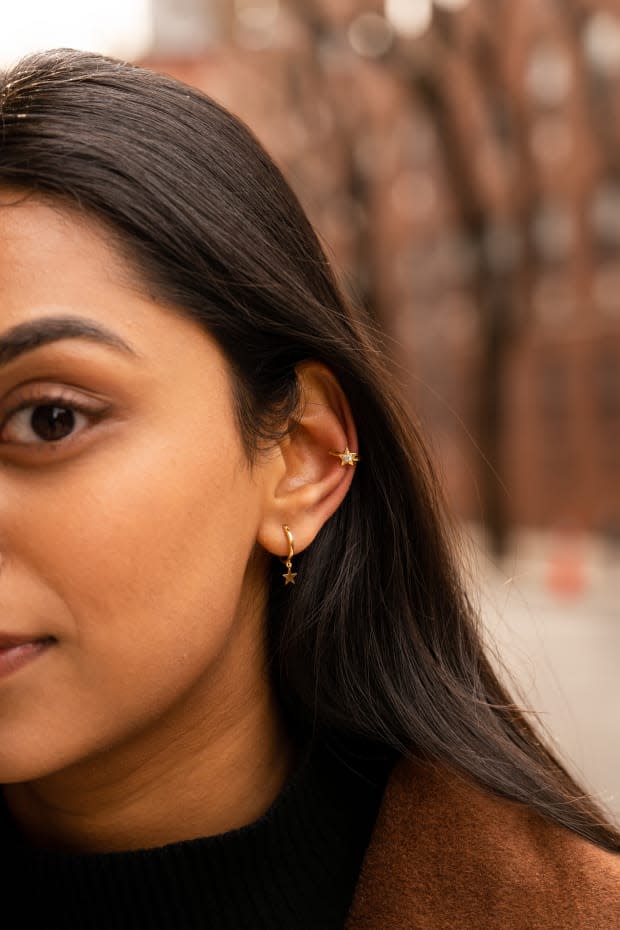Thinking Like a Tech Company Spurred Fine Jewelry Brand Mejuri's Remarkable Growth
And attracted the investor that backs Goop and Farfetch.

Mejuri founder Noura Sakkijha has big aspirations, but she's not afraid to fail. In fact, she welcomes failure — and even sees it as a crucial learning tool in doing business.
"We nurture a culture of experimentation and we expect failure in a lot of our experiments," she says on the phone from Toronto, Canada, where her company is based. "We actually encourage it."
It's just one of many things Sakkijha says that sounds more like a tech entrepreneur than a "fashion person," despite the fact that her company Mejuri is a decidedly fashion-savvy fine jewelry brand.
A third-generation fine jeweler originally from Jordan, Sakkijha started Mejuri with her husband Majed Massad in 2013 using a business model that centered on crowdsourced designs. In 2015, the couple relaunched the brand with the help of Sakkijha's brother Masoud Sakkijha, and in the time since, the brand has evolved away from crowdsourcing toward an in-house design team.
Though the brand no longer relies on design submissions, the lessons learned from Mejuri's early stages — iterate often, and listen closely to customer feedback — still inform the very Silicon Valley-appropriate way Mejuri is run today. The brand handles everything from webstore creation to influencer relationships in-house to make sure the customer experience is perfectly calibrated every time.
Mejuri also drops micro-collections every week rather than releasing bigger collections once or twice a year like a traditional jewelry brand might. Besides keeping the product selection perpetually fresh for customers, this method helps the brand gauge what pieces are resonating so it can quickly create more variations on products that sell well.
That iterative process, combined with the network of jewelry manufacturers culled from Sakkijha's history in the family business, mean that Mejuri can turn around new pieces with remarkable speed, considering the handmade nature of its pieces. But she insists that despite the emphasis on quick turnaround and her ambitious goal to make Mejuri "the number one global jewelry brand," Mejuri will never be the jewelry equivalent of a fast fashion giant like Zara.
"Everything is handmade in small quantities, so we don't create very large batches of products," says Mejuri Creative Director Justine Lançon in a phone interview. "That's the main difference with fast fashion."

Still, some of Mejuri's pieces boast prices not too far removed from the high street in spite of the fact that they're made of materials like solid gold, diamonds or gold vermeil. Priced anywhere from $29 for mini hoop earrings and $950 for an engagement ring, the brand is trying to fill a gap between pricey fine jewelry and cheap, prone-to-breaking costume jewelry. The goal is to create pieces that customers don't need a special occasion to wear or buy.
It's easy to understand why Mejuri's offering of high-quality, on-trend jewelry at a relatively low price point would be appealing to its largely millennial female customer base. That it professes to produce pieces ethically in intimate workshops in Toronto and Seoul certainly doesn't hurt in an increasingly conscious consumer market, either.
A more discerning jewelry buyer might notice that the brand's assertions that its "diamonds are conflict-free" and that it works "exclusively with suppliers who guarantee ethical sources" are largely softball claims — that is, the brand relies on its suppliers getting certified by the likes of the Kimberley Process and the Responsible Jewellery Council, both of which have been widely critiqued for creating standards that are deeply inadequate when it comes to implementing environmental and human rights protections.
When asked about the possibility of using recycled gold, Sakkijha claims it's not really all that environmentally friendly to do so, but then adds "I'm not an expert on that" when asked to cite sources that led her to that conclusion. Still, the fact that Mejuri is doing anything at all to assuage customers' consciences about where and how their pieces are made shows the brand has a better grasp of its target customer's values than many competitors. And for the average consumer, that's probably more than enough.
It's the razor-sharp understanding of the next generation of fine jewelry customers that is working so precipitously in Mejuri's favor. The brand has maintained 400 percent year over year growth at scale, selling more pieces in one week of 2018 than the entire year of 2017, according to an email from the brand. Mejuri also recently secured investment from Felix Capital, an investor that also backs Goop and Farfetch, and opened its first American store in New York City in the fall with plans for more brick-and-mortar spaces to follow.
At this rate, Mejuri really could become a global superstar in the world of jewelry in a few years' time.
"Our aspirations are pretty huge," Sakkijha says. "Yes, we are a fine jewelry brand, but it doesn't mean we can't operate like a tech company when it comes to the business."
This article has been updated to clarify that Mejuri's suppliers, not the brand itself, are certified by the Kimberley Process and the Responsible Jewellery Council.
